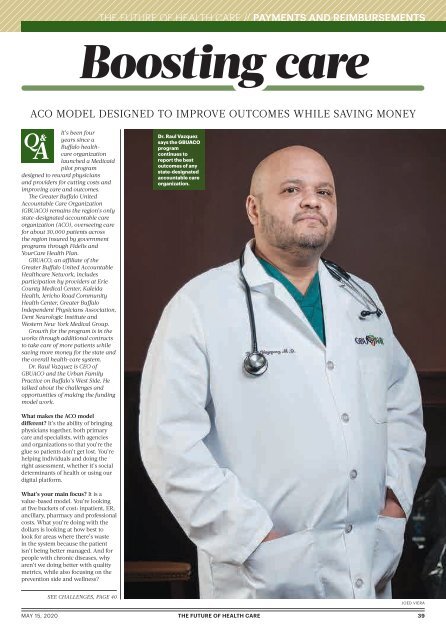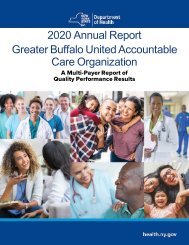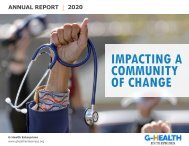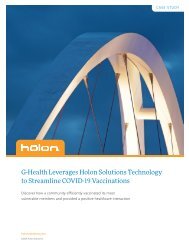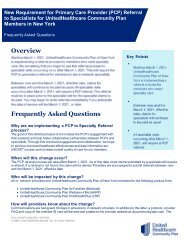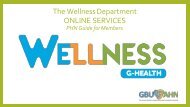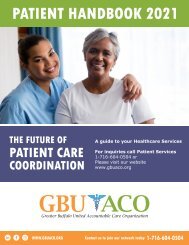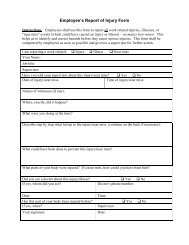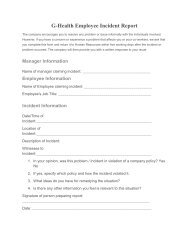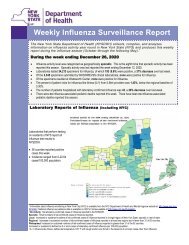Future of Health Care 2020
- No tags were found...
Create successful ePaper yourself
Turn your PDF publications into a flip-book with our unique Google optimized e-Paper software.
THE FUTURE OF HEALTH THE CARE FUTURE // PAYMENTS OF HEALTH AND CARE REIMBURSEMENTS<br />
// PATIENT CARE<br />
Boosting care<br />
ACO MODEL DESIGNED TO IMPROVE OUTCOMES WHILE SAVING MONEY<br />
Q & A<br />
It’s been four<br />
years since a<br />
Buffalo healthcare<br />
organization<br />
launched a Medicaid<br />
pilot program<br />
designed to reward physicians<br />
and providers for cutting costs and<br />
improving care and outcomes.<br />
The Greater Buffalo United<br />
Accountable <strong>Care</strong> Organization<br />
(GBUACO) remains the region’s only<br />
state-designated accountable care<br />
organization (ACO), overseeing care<br />
for about 30,000 patients across<br />
the region insured by government<br />
programs through Fidelis and<br />
Your<strong>Care</strong> <strong>Health</strong> Plan.<br />
GBUACO, an affiliate <strong>of</strong> the<br />
Greater Buffalo United Accountable<br />
<strong>Health</strong>care Network, includes<br />
participation by providers at Erie<br />
County Medical Center, Kaleida<br />
<strong>Health</strong>, Jericho Road Community<br />
<strong>Health</strong> Center, Greater Buffalo<br />
Independent Physicians Association,<br />
Dent Neurologic Institute and<br />
Western New York Medical Group.<br />
Growth for the program is in the<br />
works through additional contracts<br />
to take care <strong>of</strong> more patients while<br />
saving more money for the state and<br />
the overall health-care system.<br />
Dr. Raul Vazquez is CEO <strong>of</strong><br />
GBUACO and the Urban Family<br />
Practice on Buffalo’s West Side. He<br />
talked about the challenges and<br />
opportunities <strong>of</strong> making the funding<br />
model work.<br />
Dr. Raul Vazquez<br />
says the GBUACO<br />
program<br />
continues to<br />
report the best<br />
outcomes <strong>of</strong> any<br />
state-designated<br />
accountable care<br />
organization.<br />
What makes the ACO model<br />
different? It’s the ability <strong>of</strong> bringing<br />
physicians together, both primary<br />
care and specialists, with agencies<br />
and organizations so that you’re the<br />
glue so patients don’t get lost. You’re<br />
helping individuals and doing the<br />
right assessment, whether it’s social<br />
determinants <strong>of</strong> health or using our<br />
digital platform.<br />
What’s your main focus? It is a<br />
value-based model. You’re looking<br />
at five buckets <strong>of</strong> cost: inpatient, ER,<br />
ancillary, pharmacy and pr<strong>of</strong>essional<br />
costs. What you’re doing with the<br />
dollars is looking at how best to<br />
look for areas where there’s waste<br />
in the system because the patient<br />
isn’t being better managed. And for<br />
people with chronic diseases, why<br />
aren’t we doing better with quality<br />
metrics, while also focusing on the<br />
prevention side and wellness?<br />
SEE CHALLENGES, PAGE 40<br />
JOED VIERA<br />
MAY 15, <strong>2020</strong> THE FUTURE OF HEALTH CARE 39


